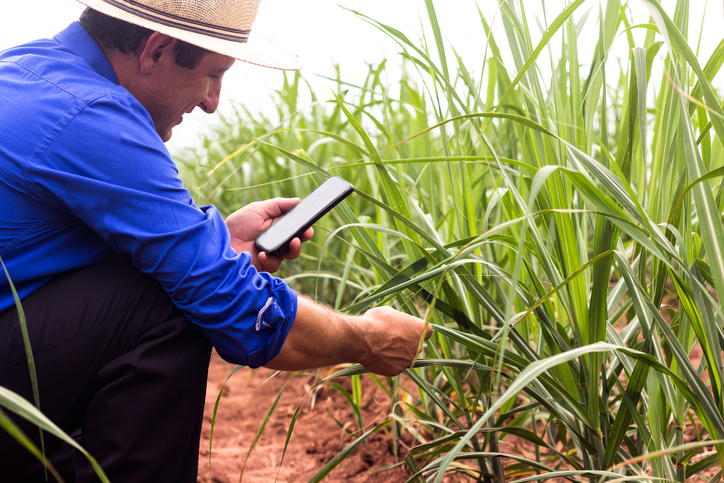
Case Study: Sugarcane growers maximize profits with 70% yield increase using CropX technology
Study Parameters: Crop: Sugarcane | Geographic Scope: North and South America, Africa, Australia | Sample Size: Hundreds of fields | Irrigation Systems: Pivot, furrow, drip | Key Metrics: Yield increase, profit improvement, resource efficiency
CropX’s irrigation management system was tested across hundreds of sugarcane fields in North and South America, Africa, and Australia. The precision irrigation technology delivered an average yield increase of 70% and significant profit improvements for growers by optimizing water timing, nitrogen management, and salinity control.
Sugarcane is extremely sensitive to both under- and over-watering, creating significant management challenges for growers. Traditional irrigation methods fail to account for the crop’s varying water needs across different growth stages, leading to suboptimal yields and resource waste.
The crop requires substantial nitrogen inputs, but poor timing leads to leaching losses and environmental concerns. Salinity accumulation threatens crop performance, while rising input costs demand more efficient resource use. Growers need data-driven tools to navigate these competing demands and optimize irrigation timing.
Water stress during sugarcane’s grand growth stage reduces both total yield and sucrose yield. However, controlled water stress during maturation actually increases sucrose yields. This creates a management paradox requiring precise timing.
Excess moisture damages roots, causes nutrient leaching, and reduces yield quality. Sugarcane has a salinity threshold of 1.7 dS/m, with each additional 1 dS/m increase causing a 6% yield decrease. Optimal irrigation extends ratoon life and maximizes overall productivity.
CropX deployed irrigation management systems across hundreds of sugarcane fields spanning North and South America, Africa, and Australia. The implementation covered multiple irrigation types including pivot, furrow, and drip systems, testing the technology’s adaptability across diverse conditions.
The system integrated soil moisture monitoring, nitrogen tracking, and salinity monitoring into a comprehensive platform. Real-time sensors provided continuous field data, while analytics transformed this information into actionable irrigation schedules. The technology optimized water timing across growth stages while preventing nitrogen leaching and salinity buildup.
Participating growers achieved an average yield increase of 70% across all monitored fields. Results remained consistent across different geographic regions and irrigation system types. Growers experienced significant profit increases through improved resource efficiency and reduced input waste.
The system enhanced decision-making by replacing guesswork with objective data. Growers achieved more consistent crop quality and improved operational efficiency. Water use became more efficient, nitrogen leaching decreased, and extended ratoon life contributed to long-term sustainability.
Precision timing proved essential for success. The ability to apply water at optimal times across different growth stages maximized both yield and quality. Integrated monitoring provided comprehensive insights needed for complex decision-making, while compatibility across irrigation systems made the technology broadly applicable.
Geographic scalability demonstrated the approach’s robustness across varying conditions. Consistent results across multiple continents and diverse soil types validated the fundamental principles underlying precision irrigation management.
The 70% yield increase represents a paradigm shift in sugarcane irrigation management. Success across diverse contexts indicates precision irrigation could become standard practice in commercial production. The technology’s compatibility with existing infrastructure removes major adoption barriers.
Precision irrigation management delivers transformative improvements in sugarcane production. The technology provides economic viability through substantial yield increases while improving sustainability through efficient resource use. Scalability across geographic and operational contexts makes these benefits accessible industry-wide.
Growers should consider precision irrigation as a high-return investment rather than optional technology. Comprehensive monitoring including moisture, nutrition, and salinity parameters delivers superior results. The industry should adopt data-driven irrigation management as essential infrastructure for competitive sugarcane production.
Julia brings with her more than 20 years of experience in corporate development, partnerships, M&As and business strategy.
Prior to joining CropX, Julia held roles such as Corporate Development Director at STK Bio-Ag Technologies, a leading global biopesticide company, and as Deputy Head of M&A at Caisse des Depots et Consignations in France. Earlier in her career, Julia served as an AVP at Lazard Freres Investment Banking and as a Manager at KPMG Corporate Finance.
Julia holds an MBA from ESSEC Business School in France.